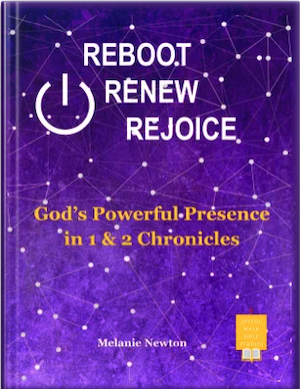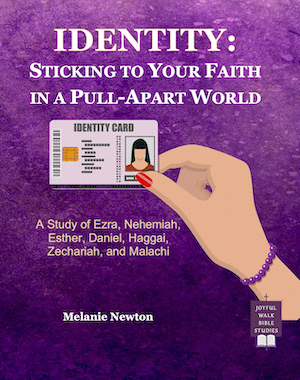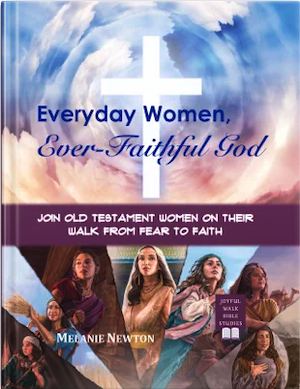Ezra, Nehemiah, Esther, Daniel, Haggai, Zechariah, and Malachi Bible Study
Identity—Sticking to Your Faith in a Pull-Apart World
11 Lessons with Podcasts and Discussion Guide
About This Study
Needing help to say “No” to the destructive influences of the world and stick to God’s way of living life?
You will get that from some rarely studied Old Testament books in this study, Identity—Sticking to Your Faith in a Pull-Apart World.
God speaks to you today through Ezra, Nehemiah, Esther, Daniel, Haggai, Zechariah, and Malachi. Are you listening? Christian, remember your IDENTITY—who you are and whose you are through your faith in Jesus Christ.
If you have been pulled away from God by the world’s destructive influences, recommit to doing life God’s way rather than the world’s way or your own way. Stick to your faith. This study will lead you to enjoy the blessings of belonging to God and living obediently to Him. See our FAQs.
Scroll down to read what others are saying about this study in the comments below.
Get “Identity—Sticking to Your Faith in a Pull-Apart World” study:
Sequel to Reboot Renew Rejoice study of Chronicles
-
Identity (Ezra, Nehemiah, Esther, Daniel, Haggai, Zechariah, & Malachi)—free download
$0.00 -
Identity (Ezra, Nehemiah, Esther, Daniel, Haggai, Zechariah, & Malachi)—printable / fillable
$10.00 -
Identity (Ezra, Nehemiah, Esther, Daniel, Haggai, Zechariah, & Malachi)—paperback
$16.00 -
Identity (Ezra, Nehemiah, Esther, Daniel, Haggai, Zechariah, & Malachi)—digital reader version
$4.99
Ezra through Malachi” Articles
Click on the picture below to read the podcast scripts for this study plus other articles related to the exile and post-exile history of Israel.

“Ezra through Malachi” Podcasts

FAQ: Exile and Return of the Jews
The last seven Old Testament books to be written are Daniel, Ezra, Nehemiah, Esther, Haggai, Zechariah, and Malachi. The historical period covered by those books is the Babylonian exile and the Jews’ return to their homeland to rebuild and resettle.
Beginning in 605 B.C. and lasting about 20 years, Nebuchadnezzar made three incursions into Judah. Each time, he removed Jews from their homeland and took them into captivity in Babylon (modern Iraq) and into other areas of the Babylonian Empire (including modern Turkey and Iran). After the 70 years of exile were over, the Persian king Cyrus the Great allowed the Jewish people to return to Judea and rebuild their temple in Jerusalem. God gave them several leaders to encourage their faithfulness to God (Daniel, Ezra, Esther, and Nehemiah). God sent three prophets to encourage them (Haggai, Zechariah, and Malachi).
The Old Testament is not irrelevant to us today. Yes, it is about the Jews and the old covenant they had with God (the Mosaic Law). Yet, the New Testament writers continually quote the Old Testament, especially referring to God’s promises to those who believe in Him and trust Him. The assumption is that you know the context of those quoted verses and why they are important. New and young Christians need to focus their Bible reading and study on the New Testament. They need to know Jesus through the gospels and all that they have in Christ through Acts and the letters that follow. But once someone is established in her faith in Christ, a Christian needs to be able to read and understand the Old Testament because God has purpose for us in those writings.
As you study Old Testament books, read first to obtain accurate understanding of what the author(s) meant. Then, use New Testament teachings to apply truth about God to your everyday life in Jesus Christ. That is what we will be doing in this study. Each lesson will help you understand what the author’s original intent was based on language studies and translation comparisons plus any historical information about the time period. Then, you are directed to consider what is taught in the New Testament about our life with Christ that applies to current situations similar to what is found in the Old Testament passages you study.
Much of the Old Testament is written in narrative form. For example, Genesis through Esther are mostly historical books. Yet, even parts of the books of prophecy are narrative (as in Jeremiah, Ezekiel, and Daniel). Narrative means the text describes what happened. It is descriptive, not usually prescriptive—a very important difference.
Descriptive means the observation of what actually happened, how people lived and made choices on how to do life at the time. For example, “David and all the Israelites were celebrating with all their might before God, with songs and with harps, lyres, timbrels, cymbals and trumpets” (1 Chronicles 13:8). This is not a restriction on the types of instruments that can be used in worship. Prescriptive means a command from God about how to live or do something that applies to all believers, all people groups, and all time periods. For example, “Love the Lord your God with all your heart and with all your soul and with all your strength” (Deuteronomy 6:5). This applies to every human who is alive or has ever lived. Unless it is prescriptive, you cannot take passages from Old Testament narratives and create a formula for doing things a certain way to guarantee God’s blessing on the result.
Image credits: hand holding ID card image from © Can Stock Photo / Abscent.; background created by spicetree687, sourced from pixabay.com (purple-608575.jpg)












Thank you so much for all of these free resources! What a blessing!